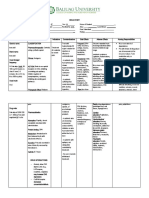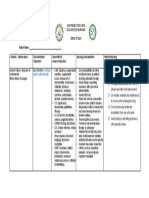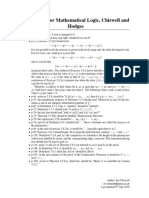0 ratings0% found this document useful (0 votes)
THP
THP
Uploaded by
tonmoyLorazepam is used to treat anxiety disorders, bipolar disorder, agitation, and dementia. It is administered orally or via intramuscular or intravenous injection. Common side effects include sedation, dizziness, weakness, and confusion, which usually disappear with continued use or reduced dosage. Nurses are responsible for (a) having equipment available to maintain a patient's airway, (b) supervising patients after injection to prevent falls, (c) monitoring lab tests for long-term patients, and (d) supervising patients with depression and anxiety closely due to suicide risk.
Copyright:
© All Rights Reserved
Available Formats
Download as DOCX, PDF, TXT or read online from Scribd
Download as docx, pdf, or txt
THP
THP
Uploaded by
tonmoy0 ratings0% found this document useful (0 votes)
Lorazepam is used to treat anxiety disorders, bipolar disorder, agitation, and dementia. It is administered orally or via intramuscular or intravenous injection. Common side effects include sedation, dizziness, weakness, and confusion, which usually disappear with continued use or reduced dosage. Nurses are responsible for (a) having equipment available to maintain a patient's airway, (b) supervising patients after injection to prevent falls, (c) monitoring lab tests for long-term patients, and (d) supervising patients with depression and anxiety closely due to suicide risk.
Original Title
thp
Copyright
© © All Rights Reserved
Available Formats
DOCX, PDF, TXT or read online from Scribd
Share this document
Did you find this document useful?
Is this content inappropriate?
Lorazepam is used to treat anxiety disorders, bipolar disorder, agitation, and dementia. It is administered orally or via intramuscular or intravenous injection. Common side effects include sedation, dizziness, weakness, and confusion, which usually disappear with continued use or reduced dosage. Nurses are responsible for (a) having equipment available to maintain a patient's airway, (b) supervising patients after injection to prevent falls, (c) monitoring lab tests for long-term patients, and (d) supervising patients with depression and anxiety closely due to suicide risk.
Copyright:
© All Rights Reserved
Available Formats
Download as DOCX, PDF, TXT or read online from Scribd
Download as docx, pdf, or txt
0 ratings0% found this document useful (0 votes)
THP
THP
Uploaded by
tonmoyLorazepam is used to treat anxiety disorders, bipolar disorder, agitation, and dementia. It is administered orally or via intramuscular or intravenous injection. Common side effects include sedation, dizziness, weakness, and confusion, which usually disappear with continued use or reduced dosage. Nurses are responsible for (a) having equipment available to maintain a patient's airway, (b) supervising patients after injection to prevent falls, (c) monitoring lab tests for long-term patients, and (d) supervising patients with depression and anxiety closely due to suicide risk.
Copyright:
© All Rights Reserved
Available Formats
Download as DOCX, PDF, TXT or read online from Scribd
Download as docx, pdf, or txt
You are on page 1/ 3
GENERIC TRAD CLASSIFICA DOSE MODE OF INDICATION CONTRAINDI SIDE-EFFECT NURSES RESPONSIBILITY
NAME E TION AND ACTION -CATION
NAME ROUTE
Lorazepam Ativan Anxiolytic; PO 2–6 Route: Management of Known Usually disappear a) Have equipment for
sedative- mg/d in Oral, psychotic sensitivity to with continued maintaining patent airway
Hypnotic; divided Intramuscu disorders, benzodiazepine medication or immediately available before
Benzodiazepin doses lar, management of s; acute with reduced starting IV administration.
e (max: 10 Intravenou bipolar disorder. narrow-angle dosage. b) IM or IV lorazepam injection
mg/d) s Management of glaucoma; Anterograde of 2–4 mg is usually
agitation and primary amnesia, followed by a depth of
dementia. depressive drowsiness, drowsiness or sleepiness that
disorders or sedation, permits patient to respond to
psychosis; dizziness, simple instructions whether
children <12 y weakness, patient appears to be asleep
(PO unsteadiness, or awake.
preparation); disorientation, c) Supervise ambulation of
coma, shock, depression, sleep older adult patients for at
acute alcohol disturbance, least 8 h after lorazepam
intoxication; restlessness, injection to prevent falling
pregnancy confusion, and injury.
(category D), hallucinations. d) Lab tests: Assess CBC and
and lactation Hypertension or liver function tests
hypotension. periodically for patients on
Special Senses: long-term therapy.
Blurred vision, e) Supervise patient who
diplopia; exhibits depression with
depressed anxiety closely; the
hearing. Nausea, possibility of suicide exists,
vomiting, particularly when there is
abdominal apparent improvement in
discomfort, mood.
anorexia.
Do not drive or engage in other
hazardous activities for a least 24–48
h after receiving IM injection of
lorazepam.
Do not drink large volumes of
coffee. Anxiolytic effects of
lorazepam can significantly be
altered by caffeine.
Do not consume alcoholic beverages
for at least 24–48 h after an injection
and avoid when taking an oral
regimen.
Notify physician if daytime
psychomotor function is impaired; a
change in regimen or drug may be
needed.
Terminate regimen gradually over a
period of several days. Do not stop
long-term therapy abruptly;
withdrawal may be induced with
feelings of panic, tonic–clonic
seizures, tremors, abdominal and
muscle cramps, sweating, vomiting.
Do not self-medicate with OTC
drugs; seek physician guidance.
Discuss discontinuation of drug with
physician if you wish to become
pregnant.
Do not breast feed while taking this
drug.
You might also like
- 400-kW Grid Connected Solar PV System: Technical and Commercial Proposal100% (1)400-kW Grid Connected Solar PV System: Technical and Commercial Proposal6 pages
- Classification Mechanism of Action Indication Contra-Indication Side and Adverse Effects Nursing Responsibilities Generic Name: ClassificationNo ratings yetClassification Mechanism of Action Indication Contra-Indication Side and Adverse Effects Nursing Responsibilities Generic Name: Classification3 pages
- Drug Mechanism of Action Indications Contraindication Side Effects Nursing Intervention Generic Name: Haloperidol (Haldol) Brand NameNo ratings yetDrug Mechanism of Action Indications Contraindication Side Effects Nursing Intervention Generic Name: Haloperidol (Haldol) Brand Name2 pages
- Nursing Responsibilities Adverse Effect Indication / Contraindication Mechanism of Action Drug Name IndicationNo ratings yetNursing Responsibilities Adverse Effect Indication / Contraindication Mechanism of Action Drug Name Indication1 page
- Drug Study: Davao Doctors College General Malvar ST., Davao City Nursing ProgramNo ratings yetDrug Study: Davao Doctors College General Malvar ST., Davao City Nursing Program3 pages
- DRUG STUDY - BSN III Center For Behavioral Sciences: Generic Name: Psychosis Adult: PO Adverse Effects CNS:ExtrapyramidalNo ratings yetDRUG STUDY - BSN III Center For Behavioral Sciences: Generic Name: Psychosis Adult: PO Adverse Effects CNS:Extrapyramidal10 pages
- DRUG STUDY - BSN III Center For Behavioral Sciences: Generic Name: Psychosis Adult: PO Adverse Effects CNS:ExtrapyramidalNo ratings yetDRUG STUDY - BSN III Center For Behavioral Sciences: Generic Name: Psychosis Adult: PO Adverse Effects CNS:Extrapyramidal7 pages
- Valproic Acid: Pharmacologic Class: CarboxylicNo ratings yetValproic Acid: Pharmacologic Class: Carboxylic2 pages
- Acute Polymorphic Psychotic Disorder With Symptoms of SchizophreniaNo ratings yetAcute Polymorphic Psychotic Disorder With Symptoms of Schizophrenia4 pages
- Brand Name: Chemical Effect: CNS: DizzinessNo ratings yetBrand Name: Chemical Effect: CNS: Dizziness2 pages
- Injections: 2.5mg/ml in CNS: Drowsiness,: DroperidolNo ratings yetInjections: 2.5mg/ml in CNS: Drowsiness,: Droperidol3 pages
- Ds Nicolas, Sherena Q. BSN IV-1 Group 4 NCM 118 (Lab)No ratings yetDs Nicolas, Sherena Q. BSN IV-1 Group 4 NCM 118 (Lab)4 pages
- Dosage: 50 MG Order: PRN q6h Route: IV (Case Scenario Based)No ratings yetDosage: 50 MG Order: PRN q6h Route: IV (Case Scenario Based)3 pages
- Construction of Treasury Building at Kuthar Himachal Pradesh Case Study CardNo ratings yetConstruction of Treasury Building at Kuthar Himachal Pradesh Case Study Card1 page
- Guidelines For PG Grant Scheme For Gate/Gpat Qualified StudentsNo ratings yetGuidelines For PG Grant Scheme For Gate/Gpat Qualified Students2 pages
- EEE 309 Communication Theory: Semester: January 2017 Semester: January 2017No ratings yetEEE 309 Communication Theory: Semester: January 2017 Semester: January 201712 pages
- Metals: Charpy Impact Properties of Hydrogen-Exposed 316L Stainless Steel at Ambient and Cryogenic TemperaturesNo ratings yetMetals: Charpy Impact Properties of Hydrogen-Exposed 316L Stainless Steel at Ambient and Cryogenic Temperatures14 pages
- Determine The Quantity of Casein in Milk (Chemistry Investigatory Project (AutoRecovered)No ratings yetDetermine The Quantity of Casein in Milk (Chemistry Investigatory Project (AutoRecovered)4 pages
- Ramsar Sites in India - List of Ramsar SitesNo ratings yetRamsar Sites in India - List of Ramsar Sites4 pages
- Dive Xtras X-Scooter Series Owner S ManualNo ratings yetDive Xtras X-Scooter Series Owner S Manual23 pages
- Mechanical Enginering Soft and Hard Skills Course FNo ratings yetMechanical Enginering Soft and Hard Skills Course F2 pages
- Grade 8 - Archimedes: Pigcarangan Integrated School Weekly Home Learning PlanNo ratings yetGrade 8 - Archimedes: Pigcarangan Integrated School Weekly Home Learning Plan4 pages
- (English (Auto-Generated) ) Andrew Tate BEFORE He Was Famous. (FULL Interview) (DownSub - Com)No ratings yet(English (Auto-Generated) ) Andrew Tate BEFORE He Was Famous. (FULL Interview) (DownSub - Com)169 pages





























































































